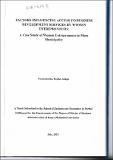| dc.description.abstract | Small and micro enterprises (SMEs) are recognised as important economic drivers both the developed and developing countries. Kenya identifies the development of SMEs as one of the main strategies for industrialization, employment generation and poverty reduction. However SMEs face numerous constraints to growth and performance and various players including governments, donor agencies, and private sector practitioners have turned to Business Development Services to offer solutions to these challenges. Business development services generally seek to raise the profitability and enhance the growth and competitiveness of enterprises, and if appropriately applied, can act as an enhancer of access to finance and as an alternative form of "collateral" in circumstances where tangible collateral may be an impediment to meeting traditional security requirements. However studies conducted in Kenya and elsewhere indicate that on average only 7% of SMEs have had access to Business Development Services (BDS). This study sought to establish the influence of various factors influencing access to Business development services (BDS) by women entrepreneurs in Meru Municipality. The study used a descriptive research design. The target population was women entrepreneurs in Meru Municipality. Selected categories of businesses were identified for the study and a sample of 42 respondents chosen. The data was collected by administering a questionnaire to the respondents. The data collected was analyzed using descriptive statistics and linear regression with help of SPSS statistical package. The results presented in tables and figures. The test of hypothesis was done using regression analysis. The study revealed that awareness, cost of business development services, networks, and nature of business development services had a significant relationship with level of access to business development services which accounts for 74.5% of the variations of the dependent variable. The significance of the independent variables to dependent variable was found as follows: networks (0.00 I); awareness (0.003); cost of BDS (0.005) and Nature of BDS (0.12) in that order. The study also revealed that in Meru Municipality majority (64%) of women entrepreneurs were aware of existing business development services and understood the importance of the services and this explains the high rate of access to diverse business development services, like for example advice on how to access to business credit (90%). The study recommends the need by government, NGOs, financial institutions and other business development providers to reassess policies and strategies related to the delivery of the services in order to increase the number of those accessing the services since a significant number (16. 7) of entrepreneurs were found to be dissatisfied with the services. The study recommends further research on the effect of government and other stakeholders' policies on access to business development services by women entrepreneurs in Meru Municipality. | en_US |

